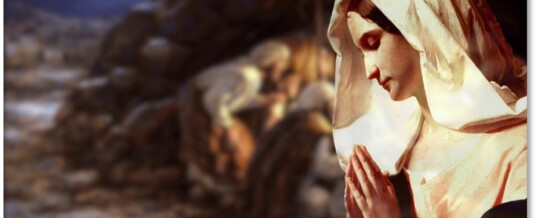
You may know the name Victor Frankl. This Austrian was a neurologist, a psychiatrist, a philosopher, and a writer—one of Europe’s brightest minds. But he may be best known as a Holocaust survivor. He survived various Nazi concentration camps during the Second World War and shared that experience in his best-selling book Man’s Search for Meaning. After his miraculous survival, he went on to give talks all over the world. When in front of American audiences, he was fond of saying, “I recommend that the Statue of Liberty on the East Coast be supplemented by a Statue of Responsibility on the West Coast.”
When I think of responsibility, I think of Mary. What a tremendous responsibility lay upon her shoulders as the Mother of God. She was chosen not for the sake of being chosen or for privilege; she was chosen for a mission. She couldn’t go into this mission without first pondering and praying. This pattern will be repeated in Jesus’s own life when he grows into adulthood. Before every big decision in his life, Jesus goes off to a quiet place–a desert, a mountain–in order to ponder and pray.
Getting back to Mary, I wonder what she pondered in those early days of Jesus’s earthly life. Perhaps she pondered (forgive the grammatical awkwardness of it): “This is the life God is in.” Many of us think we have to purge out all sin before God will even consider dwelling in our midst. Or, perhaps during rough times, we figure we have to correct some mess that we’ve caused in order to coax God’s blessing back into our lives. I’ve begun to realize, only later in life, that God might actually be present in the middle of the mess of my life and my pain, calling me to trust God who is always there even when I’m trying to attract Him back with some impressive, spiritual cartwheels. He doesn’t have to come back when things are less messy, because never left in the first place.
Our advantage as Christians is that we believe we don’t have to ascend to God, but that God has descended to us. God comes to us in the messiness of our lives. Jesus was born to an unwed teenager. There was no baby shower to welcome him. Instead, his head was on a “wanted” poster dead or alive—preferably dead. His family immediately flees to Egypt as refugees. Upon returning, they settle in Nazareth, the hick town of all hick towns. Jesus grows into manhood and is missioned not with a certificate bestowed upon him by a university chancellor but by being dunked in the Jordan River by a kooky prophet. He called uneducated, working-class people to follow him. He hangs out with the sick, the demon-possessed, the poor, and those with tarnished reputations. He’s mocked as “friend of sinners.” When he did get invite to dinner by the elite, it never went well. At some point during the meal, he pulled back the curtain on the messiness of their lives and exposed them for being sinners just like everyone else. He couldn’t get away from the mess then, nor does he avoid the mess that is our lives, the life of the Church, and the life of the world. He remains present among sinners. If he is present in this world (as I believe he is), where else would he be? “This is the life God is in.”
If you are struggling in your marriage or a child is breaking your heart, you don’t need to straighten it out first in order to find God. God is right there in the midst of it all. You don’t need to lower every hill and raise up every valley in order to make a path for your God. You don’t need to sweep all the dust away and straighten up the house. This Guest will walk through doors—dust or no dust—to get to you. He won’t be put off because you’re so angry you can’t think straight. He won’t slam the phone down on you or put you on hold until you start jumping through the right religious hoops. He’ll stay on the line until the ranting and raving is over and remind you of the goodness that has never left your heart. “This is the life God is in.” You don’t have to leave that life to find him. You don’t have to clean it up or dress it up for him to be attracted to you. You just have to want him a fraction of how much he wants you.
I suppose the Cross is the ultimate sign of how much God wants us. Jesus hangs between two guilty thieves in the midst of ugliness, corruption, injustice, hatred and violence. And in the midst of that mess he said, “Father, forgive them, for they do not know what they are doing.”
“This is the life God is in.” It may seem hopeless and overwhelming at times, but it’s God’s preferred hiding place and God’s preferred place of revelation. Maybe that’s what Mary was pondering.
Fr. Phil Mulligan
JAN
2022

About the Author: